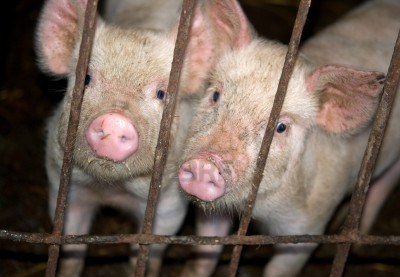Agricultural animals are not covered by the federal Animal Welfare Act. Many states also exclude them from their anti-cruelty laws. As a result, they have virtually no legal protections at all and spend their short lives in horrific misery before being turned into salable flesh (or, in the case of laying hens, into compost). However, there are a few federal regulations that still apply and some states do not exempt them from cruelty protections.
 The most powerful force for animal protection, though, is public outrage. Most people do not know how animals are treated in agriculture and are outraged when they learn. Consequently, activists sometimes chronicle some of the more egregious abuses in undercover videos. The videos themselves document everything from standard procedures in factory farms to deliberate, conscience-shocking acts of sadism.
The most powerful force for animal protection, though, is public outrage. Most people do not know how animals are treated in agriculture and are outraged when they learn. Consequently, activists sometimes chronicle some of the more egregious abuses in undercover videos. The videos themselves document everything from standard procedures in factory farms to deliberate, conscience-shocking acts of sadism.
Faced with these abuses, how have state legislatures reacted? By turning the videographers into criminals. People who expose the animal abuses now face draconian penalties and felony status. So-called “Ag-Gag” bills have become law in a dozen states with several more poised to make the leap. Under one proposed law, named the Animal and Ecological Terrorism Act (you can’t make this stuff up), those convicted of documenting animal abuse at agricultural facilities would potentially face felony charges and have their name added to a “terrorist registry.”
I am in the midst of a monograph that discusses how in the absence of any legal protections, agricultural animals cannot be victims in the eyes of the law. This despite the unspeakable cruelty they must routinely endure. This leaves a “victim vacuum” of sorts. And nature abhors a vacuum. So, now we have a campaign to protect the victimizers. This is the world of Ag-Gag laws. The mainstream media has started to cover this phenomenon and you can read about here, here, and here.
Imagine a world where, faced with widespread condemnation of their sadistic practices, the abusers successfully lobby the government to make exposing their behavior into a felony.
There. You’ve imagined the United States. Now what?









